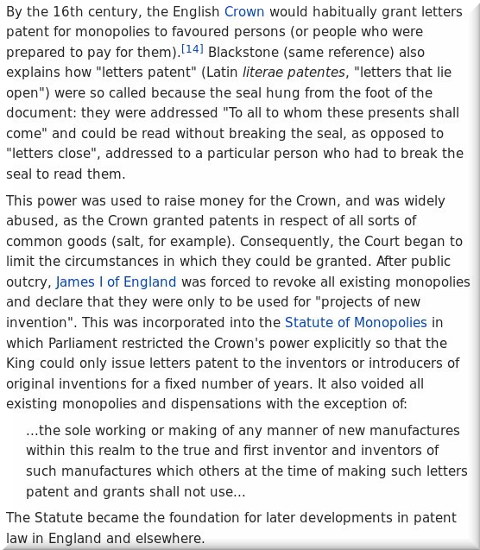

Reference: History of patent law
IN his writings about USPTO-granted patents, Professor Crouch recently looked at pertinent laws and went somewhat philosophical. Yesterday he deconstructed a patent where one of the supposed merits or inventions is that the operator of a vehicle needs to be present. To quote: "The claims require that the operator platform “support an entire body of an operator” during operation use of the vehicle."
"We certainly hope that the Patent Office sticks to the principle that human operation (a la business methods) as opposed to mechanics should not become patentable."We have no issues with patents on mechanics, however to name a human being as some sort of ingredient is approaching the territory of the laughable. Lawn mowers have existed for a very long time (nearly 200 years according to Wikipedia) and having an operator present on top isn't entirely novel, either. We certainly hope that the Patent Office sticks to the principle that human operation (a la business methods) as opposed to mechanics should not become patentable.
"The “public rights” issue is complicated," Crouch explains. "but the basic outcome is simple – if patents rights are not public rights (but instead private rights) then an administrative agency cannot lawfully revoke a patent once issued (without the permission of the patentee)."
"Well, a patent is a government-granted monopoly and not a "property" or an "asset" per se."Crouch later posted some more thoughts, noting that "[i]n the “land patent” system, ownership is originally vested in the sovereign and then transferred to the recipient, but it seems to me that the patents on inventions probably work differently. In the end, I expect that this may have some impact on the public-rights cases."
Well, a patent is a government-granted monopoly and not a "property" or an "asset" per se. Artistic wordings that attribute physical properties to ideas are worse than dishonest; that's how the recording industry paints copying (or sharing) as "piracy" and "theft". Saying things like "ownership" (or similar, e.g. someone "bought" a patent or "stole" a patent) makes as much sense as "eating" an idea.
Patents are not rights but exceptional privileges with burden of justification on the recipient. If the "administrative agency cannot lawfully revoke a patent," to quote the above, even when a patent was obviously granted in error or is doing a disservice to public interests (not so-called 'public rights'), then maybe it's time to return to the drawing board. The history of patent systems is checkered and complex and if anything is to be learned from this history, it is that no patent system should be taken for granted and blindly accepted. We need to evolve in lieu with dissemination of concepts over the Internet, the programmability of computers without having to reconfigure hardware (mechanics), and many other advancements. ⬆
Comments
Anton_P
2017-02-17 13:42:05
Dr. Roy Schestowitz
2017-02-17 14:10:16
Anton_P
2017-02-17 14:22:31
Dr. Roy Schestowitz
2017-02-17 16:31:15